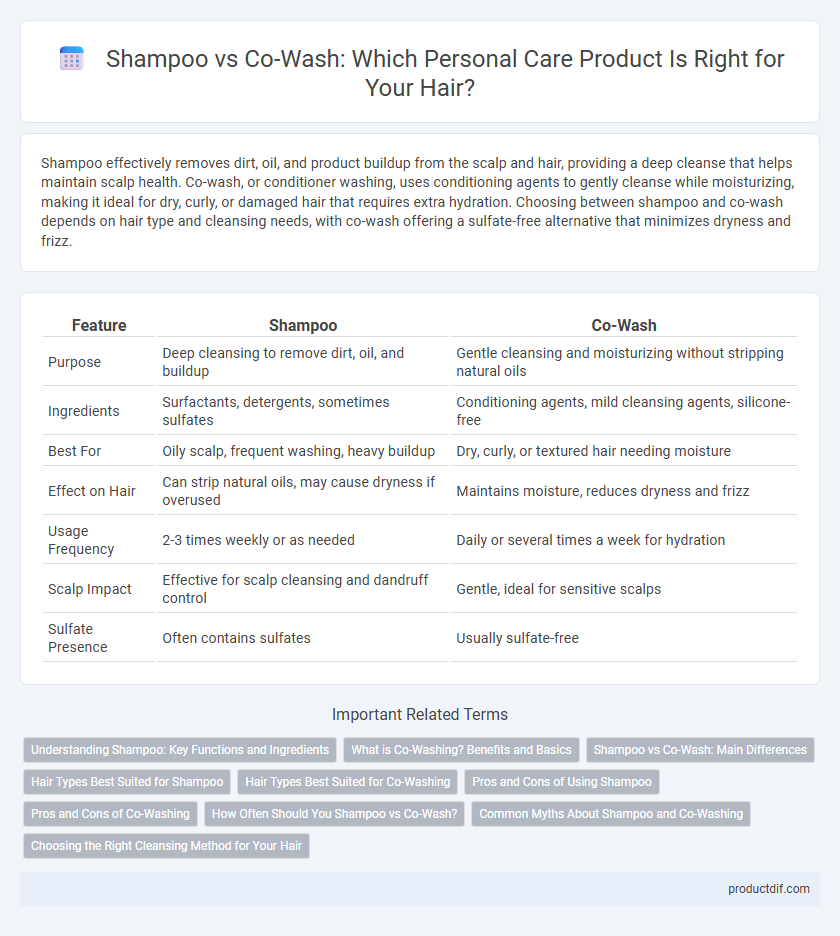Shampoo effectively removes dirt, oil, and product buildup from the scalp and hair, providing a deep cleanse that helps maintain scalp health. Co-wash, or conditioner washing, uses conditioning agents to gently cleanse while moisturizing, making it ideal for dry, curly, or damaged hair that requires extra hydration. Choosing between shampoo and co-wash depends on hair type and cleansing needs, with co-wash offering a sulfate-free alternative that minimizes dryness and frizz.
Table of Comparison
| Feature | Shampoo | Co-Wash |
|---|---|---|
| Purpose | Deep cleansing to remove dirt, oil, and buildup | Gentle cleansing and moisturizing without stripping natural oils |
| Ingredients | Surfactants, detergents, sometimes sulfates | Conditioning agents, mild cleansing agents, silicone-free |
| Best For | Oily scalp, frequent washing, heavy buildup | Dry, curly, or textured hair needing moisture |
| Effect on Hair | Can strip natural oils, may cause dryness if overused | Maintains moisture, reduces dryness and frizz |
| Usage Frequency | 2-3 times weekly or as needed | Daily or several times a week for hydration |
| Scalp Impact | Effective for scalp cleansing and dandruff control | Gentle, ideal for sensitive scalps |
| Sulfate Presence | Often contains sulfates | Usually sulfate-free |
Understanding Shampoo: Key Functions and Ingredients
Shampoo is formulated to cleanse the scalp and hair by removing dirt, oil, and product buildup through surfactants like sodium lauryl sulfate or milder alternatives such as cocamidopropyl betaine. Key ingredients often include moisturizing agents like glycerin, proteins for strengthening, and pH-balancing compounds to maintain scalp health. Unlike co-wash products that focus on gentle conditioning, shampoo aims to thoroughly purify while supporting hair integrity and scalp cleanliness.
What is Co-Washing? Benefits and Basics
Co-washing, or conditioner washing, involves cleansing hair using only conditioner instead of traditional shampoo, helping to retain natural oils and moisture. It is especially beneficial for dry, curly, or textured hair types that tend to be more prone to frizz and breakage. Regular co-washing improves hair softness, reduces scalp irritation, and maintains healthier hair strands by avoiding the harsh sulfates found in many shampoos.
Shampoo vs Co-Wash: Main Differences
Shampoo primarily cleanses the scalp and hair by removing dirt, oil, and product buildup through surfactants, making it ideal for deep cleansing and oily hair types. Co-wash, or conditioner washing, uses conditioning agents to gently cleanse the hair without stripping natural oils, making it beneficial for dry, curly, or chemically treated hair. The main difference lies in their formulation and cleansing intensity, with shampoo focusing on thorough cleaning and co-wash prioritizing moisture retention and mild cleansing.
Hair Types Best Suited for Shampoo
Shampoo is best suited for oily or fine hair types that require effective cleansing to remove excess sebum and product buildup. It excels at deep cleaning without leaving residue, making it ideal for individuals with scalp conditions or those exposed to environmental pollutants. People with normal, oily, or chemically treated hair benefit most from regular shampooing to maintain scalp health and hair vitality.
Hair Types Best Suited for Co-Washing
Co-washing is best suited for individuals with dry, curly, or textured hair types as it helps retain natural oils and prevents excessive moisture loss. Those with fine or oily hair may find co-washing less effective, as it can lead to buildup and weigh hair down. Co-washing enhances softness and manageability for coarse hair while maintaining scalp hydration without stripping natural oils.
Pros and Cons of Using Shampoo
Shampoo effectively removes dirt, oil, and product buildup from the scalp and hair, providing a deep clean that leaves hair feeling fresh and manageable; however, frequent use may strip natural oils, causing dryness and potential scalp irritation. Its surfactant-based formula suits oily or fine hair types but can be too harsh for curly or textured hair that benefits from moisture retention. Shampoo offers versatility for various hair concerns, yet users must balance cleansing with hydration to prevent over-drying.
Pros and Cons of Co-Washing
Co-washing, or conditioner washing, provides a gentle cleansing method by using conditioner instead of shampoo, which helps retain natural oils and reduces scalp dryness, making it ideal for dry, curly, or damaged hair. However, co-washing can lead to product buildup and may not effectively remove heavy dirt or oil, potentially causing scalp irritation or itchiness. Choosing co-wash products with lightweight, non-comedogenic ingredients minimizes residue and supports scalp health while maintaining moisture balance.
How Often Should You Shampoo vs Co-Wash?
Shampooing frequency varies based on hair type, scalp condition, and lifestyle; most individuals benefit from shampooing 2-3 times per week to remove dirt, oil, and product buildup effectively. Co-washing, or conditioner washing, is suitable for daily or more frequent use, especially for curly, dry, or chemically treated hair, as it gently cleanses without stripping natural oils. Balancing shampoo and co-wash routines prevents over-drying while maintaining scalp health and hair hydration.
Common Myths About Shampoo and Co-Washing
Many believe shampoo strips all natural oils, causing dryness, while co-washing is thought to be the superior gentle cleansing method. Shampoo cleanses thoroughly by removing dirt, buildup, and excess oils, which co-washing alone may not fully eliminate. Using shampoo and co-wash strategically based on hair type and scalp needs promotes healthier hair than relying solely on one method.
Choosing the Right Cleansing Method for Your Hair
Selecting the right cleansing method depends on your hair type and scalp needs, with shampoo providing deep cleansing by removing buildup and excess oil, while co-wash offers a gentle alternative that preserves natural moisture and beneficial oils. Shampoo is ideal for oily scalps or heavy product use, effectively eliminating dirt and residues, whereas co-washing suits dry or curly hair by maintaining hydration and preventing frizz. Understanding your hair's texture, porosity, and scalp condition ensures a tailored routine that balances cleanliness and nourishment for optimal hair health.
shampoo vs co-wash Infographic

 productdif.com
productdif.com